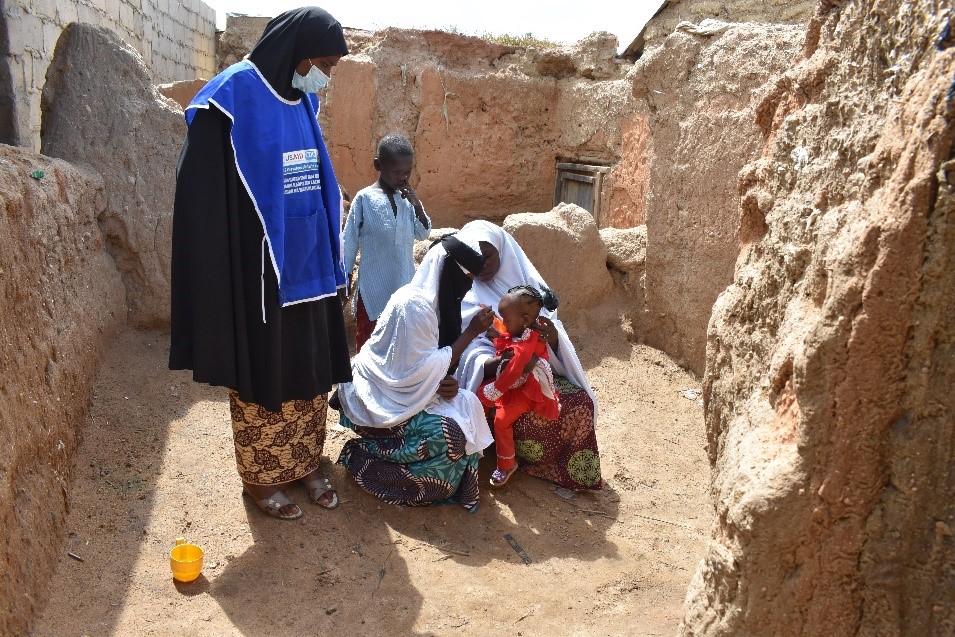Engaging the Private Sector: Three Ways PMI-S is Working to End Malaria in Nigeria
Engaging the Private Sector: Three Ways PMI-S is Working to End Malaria in Nigeria

The 2021 World Malaria Report highlights the need to ensure equitable access to quality malaria prevention and treatments services in Nigeria, which accounts for 27% of global malaria cases and deaths. Available data suggest that over 60% of health care services in Nigeria are delivered through the private sector, making it critical in successful malaria control efforts.
Recognizing the need to successfully engage private sector stakeholders in malaria prevention and control efforts, the US President’s Malaria Initiative for States (PMI-S) Project carried out a mapping exercise–a methodical review of issues within a local area to design and develop effective interventions–in Akwa Ibom and Oyo States to better understand the challenges and needs in private sector services. Findings and recommendations from this mapping exercise provided the basis for the three ways PMI-S has been working to strengthen private-sector involvement and subsequent private sector engagements in eliminating malaria in Nigeria.
Identifying and coordinating private health facilities providing malaria services
Since one of the overarching objectives of the PMI-S mapping activity was to investigate the available resources, infrastructure, and expertise within the private sector to then deliver quality malaria prevention and treatment services, PMI-S worked with the State Ministries of Health and professional associations such as the Association of General and Private Medical Practitioners, the umbrella organization in Nigeria for all medical and dental doctors in private practice, to regularly update lists of local private health care providers operating in the states. This provider database is now updated annually and serves as a critical tool for continuous engagement and collaboration.
According to Biodun Akande, Deputy Director, Planning Research and Statistics, Oyo State Ministry of Health, the Oyo State health facilities register has been successfully updated with the information gathered during the private sector mapping exercise, which has “helped the State Ministry of Health determine the exact number of private health facilities in the state, their registration status, and their location within the state.”
Addressing capacity gaps in malaria prevention and treatment services
One of the main findings from this exercise revealed that 50% of private health workers assessed had not received any form of refresher training on malaria within the past year. To address this skill-building need, PMI-S prioritized their support to the State Malaria Elimination Programmes to then create a capacity development plan as a key component of the state-specific private sector engagement strategy.
Within the past year in Akwa Ibom and Oyo States, PMI-S has trained 442 health care providers (Akwa Ibom: 186; Oyo: 256) from 229 private health facilities (Akwa Ibom: 102; Oyo: 127) on malaria case management, malaria in pregnancy, and data management. To improve the quality of service delivery and reporting from private health facilities, PMI-S also integrated private health facility monitoring into its design and included and encouraged their participation during data validation meetings.
According to the private health facilities’ workers, such as Dr. Olayide Majeed Oladidpupo, Chief Medical Director, Lad Medical Centre, a PMI-S supported private health facility in Ibadan Oyo State: “PMI-S support and training sessions have definitely improved the quality of malaria services we provide in Lad Medical Centre. We now carry out malaria rapid diagnostic tests appropriately and no longer treat fever cases with anti-malaria medication based on instinct. We investigate our cases, so we are more certain that we know the actual cause of fever and that our treatment is based on guidelines.”
Mobilizing funds from private sector organizations to improve the quality of malaria services
PMI-S is working with the state governments to create incentives, such as tax concessions and government recognition, to motivate private sector chief executive officers, managing directors, and members of boards of directors to contribute funds toward malaria elimination interventions.
PMI-S remains committed to enabling local investments and private sector actions to support USAID and Nigerian government’s efforts to achieve a malaria-free Nigeria. This is in line with a core strategic objective of PMI-S: to enable increased government and private sector financing and commitments for malaria prevention and control in supported counties, states, and communities.